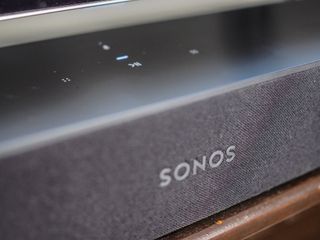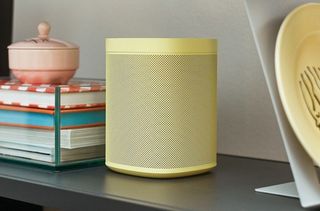Google Assistant on Sonos is just as good as you hoped it would be

Every CES, there are the announcements you expect from companies that put together big, splashy keynotes and ornate, over-the-top booths on the Convention Center floor, and then there are companies like Sonos with nothing new to announce but everything to gain from being here.
To wit, when Sonos invited me to spend some time with their director of global product marketing, Dane Estes, I wasn't expecting much — merely an overview of the company's existing products and perhaps a few generalities about what to expect in 2019. Instead, I got one of the most anticipated demos in the smart home space right now.
I was given a demonstration of the current state of Google Assistant on the Sonos ecosystem, something that dedicated customers have been waiting over a year for. The project was already delayed once, and Estes admits that it's the first question people ask him when they learn he works for Sonos: when is Google Assistant integration coming?

The version I heard was still in beta, but I didn't notice any of the bugginess and unpredictability that are usually accompanied by such integrations. Even things like Assistant's Continued Conversions feature was working perfectly. Estes said that the company learned a great deal from its expansion into the smart home space with Alexa support on the Sonos One and Beam, and used a lot of those learnings to prevent things like unwanted activations and ensure continuity between devices,
Sonos also confirmed that while it won't be possible to use Google Assistant and Alexa on the same smart speaker (and only Sonos One and Sonos Beam at this time), the two assistants can easily co-exist in the same room on different Sonos speakers (say Alexa on a Beam below the TV and Assistant on a bunch of Sonos One surrounds) and share a continuity structure to ensure that Spotify — or practically any music service Sonos supports — can understand the context of where a user left off.
Estes demoed a series of commands for me on a Sonos Beam running a beta build of Google Assistant, and what struck me was just how identical it was to using a Google Home — except that it sounded much, much better.
Sonos delayed Assistant's release because it wanted to get it right from day one — and avoid the same criticisms of its Alexa integration.
He anticipates that, as with Alexa support, Google Assistant will improve and become more reliable on Sonos devices over time, but when it finally does roll out to the public in the near future, it should be considerably more robust than Alexa was when Sonos added it in late 2017. That's mainly because Sonos has been working so closely with Google on the integration, and because its protracted beta program has resulted in swaths of internal data on how, and from where, people speak to smart speakers.
Be an expert in 5 minutes
Get the latest news from Android Central, your trusted companion in the world of Android
The close relationship with Google has also afforded another benefit: using Sonos speakers without microphones as endpoints for Assistant. Announced yesterday, the functionality is similar to Sonos's Alexa integration: ask a phone or Home Mini to play Spotify on a nearby Play:1 or Play:5 and it will work, just like a Cast target.
That doesn't mean the experience will be perfect, though. For starters, Google Assistant won't immediately have access to music services that it doesn't inherently support — Tidal or Apple Music, for example — despite Sonos itself offering both. However, if you begin playing a song on Tidal through the Sonos app, it's possible to pause and resume the song on the Beam — it's just that initial command that has to be done somewhere else.
Sonos prides itself on something called "continuity of control", which is the idea that its products should work together regardless of where you're talking to them, be it in the app, on the speaker itself, or using voice, but the company isn't magically adding support for things that Google itself doesn't offer.
So when's the release date? Sonos has been testing Assistant in private beta for months now, and Estes told me that the company is expanding that private beta to include thousands of people by the end of January. Whether that means we'll see a public beta in the next few weeks or months remains to be seen, but based on what I saw — and heard — in this posh room inside the Mirage hotel, it's going to be worth the wait.
Daniel Bader was a former Android Central Editor-in-Chief and Executive Editor for iMore and Windows Central.

